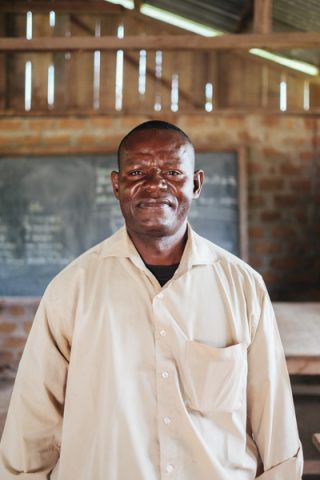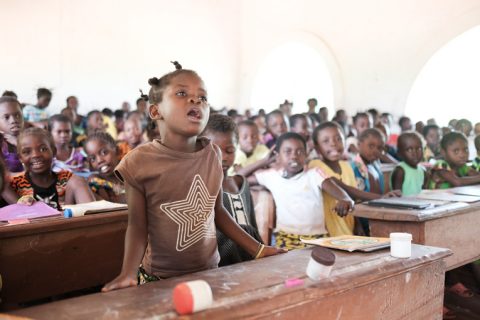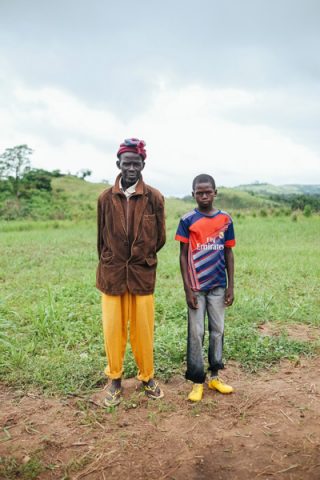Central African Republic recovering step by step, with children returning to school
Safe schools and competent teachers are key in determining the future of the Central African Republic. The work of Finn Church Aid has encouraged local children and young people to return to school.
Squeals can be heard from a distance at the yard of Sangha school. It is recess, and the air is thick with red sand, with a group of boys running after a football turned yellow by the sun.
In the white classroom, little wooden desks are placed close to one another. The classroom can seat 150 pupils. The ones who do not fit in are left to peer in through the window. At the start of the school day, the number of pupils present for the day is marked in the upper corner of the chalkboard.
Although the school is crowded, it is in better condition than it was two years ago, when 14-year-old Christopher Tindo started at the school.
”The school was missing doors, windows and benches. They had all been stolen or broken. Now we can leave our books at school and lock the door, and no one can get in to take our things,” says Christopher.
Conflict took the doors from the school

Jean Lessene thinks the most important function of a school is to teach how to live in peace.
The history of the Central African Republic is mottled with bloody tyranny and coups. In 2013, the situation turned violent, when the Séléka group consisting mostly of Muslims seized power, and the mainly Christian Anti-balaka groups rose to fight it.
The armed groups used school as bases because of their central locations. Most schools have been damaged or completely destroyed in the conflict. Education sector head Jean Lessene from Bayanga subprefecture says that armed groups took anything that could be used for firewood, up to the roof and the desks, and looted anything that was the least bit useful.
Families fled to the jungle, to farther-off villages, or across the border to neighbouring countries. Many children have not dared return to school.
Authorities, Finn Church Aid (FCA) and churches have campaigned together to get the children to return. The work has garnered resuts, and in many schools the number of pupils has doubled.
”Before the war, Muslims and Christians lived and went to school together. During the fights, Muslims fled, and some of them still have not dared return. We hope they come back,” says Lessene.
Educating teachers has enormous importance
Not all teachers have returned, either. Educated people either flee or seek better-paid employment. The ones left are less educated teachers and volunteers.
In Bayanga, out of the 43 teachers in the schools only five had gone through the official teacher training. Now, FCA has trained 17 teachers and pays them a small fee. Many of them had no prior experience of teaching.
”Thanks to the FCA training and teaching materials, they are now able to teach the children better. Without this support, education would not matter much around here,” says Jean Lessene.

The competition for a turn to answer a question is fierce, with up to 150 pupils per class.
Geography without maps
The wall is high, and shards of glass glitter on top of it. No one will climb over this wall to the FCA regional office in the city of Berbérati in a hurry. Walls like this are a common sight in Central Africa. The situation remains unstable.
Over 63,000 children got to go to school
Central African Republic is one of the poorest countries in the world. In 2017, it was named the third most fragile nation after South Sudan and Somalia.
Nearly half of the population (2,2 million) is in need of humanitarian aid. According to UN estimates, almost half a million citizens of the Central African Republic are refugees in neighbouring Chad, Cameroon and the Democratic Republic of the Congo.
Finn Church Aid opened a country office in the capital Bangui in autumn 2013, and has worked in the midst of the Central African chaos ever since. FCA provides humanitarian aid to those in the most acute need, supports the development of education in the middle of conflict, and helps communities prevent and settle conflicts.
In 2016, more than 63,000 children benefitted from FCA’s education projects in the Central African Republic.
However, the gate is now opened, as a lorry backs to the yard. Kofi Ayisa is satisfied, school supplies are finally delivered. The lorry is filled with books, notebooks and pencils.
The delivery is a few days late, because the lorry got stuck in mud a couple of times during the journey. The rainy season is beginning, and the roads are a muddy mess.
”We are working in the parts of Africa that are the hardest to reach. More than once we have got stuck while on the road, and we have been forced to sleep in the car, in the middle of the jungle, pestered by mosquitoes,” says Ayisa from Togo, in charge of the FCA regional office in the city of Berbérati.
In rural Central Africa, getting around is very difficult. When FCA employees leave the Berbérati regional office for the village of Nola 150 kilometres away, the journey is estimated to take five hours.
”And this is a road in fairly good condition. We go to places that most organisations do not go. In many places, we are the only aid organisation. Someone needs to do this job, and FCA will be there. The challenges are big, but you have to start from somewhere.”
Despite diamonds, gold and other natural resources, Central African Republic is one of the poorest and most underdeveloped nations in the world. Berbérati is the nation’s third-biggest city but lacks running water and electricity.
In rural areas, there is also an enormous need for school supplies. It is common, for example, for geography to be taught without maps. The children cannot locate their own village on a map, let alone Central African Republic or its neighbouring countries.
”These children are supposed to go to university without ever having seen a map or a microscope – and they are meant to become doctors and decision-makers!” says Ayisa.
School teaches forgiveness
Despite difficulties, school brings stability to everyday life and and creates hope for the future. In Central Africa, the eagerness of the students gives hope.

Christopher Tindo’s favourite thing about school is peace education. Grandfather Aobimou Nzerebaile
encourages the boy to study.
14-year-old Christopher studies hard. If he does not understand the subject of the lesson, he spends recess indoors going over it again. He dreams of becoming a teacher.
Head of the education sector Jean Lessene thinks that at its best, school can bring society together.
”The most important things that school can teach are the significance of peace and social unity,” says Lessene.
”Getting children back to school is a job for the entire society – the village community, parents and the government. It is the only way to guarantee a better future for this country.”
Christopher’s favourite subject at school is peace education. It involves the teacher talking about peace, living together, forgiveness and reconciliation.
“Peace is very important, and everyone should cherish forgiveness, love and joy everywhere in their own countries,” explains Christopher.
Text: Noora Jussila
Photos: Tatu Blomqvist